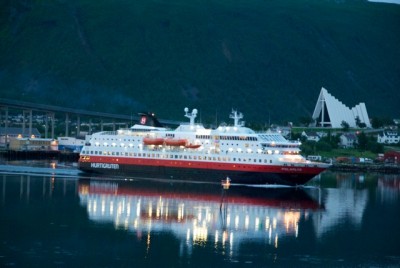A great state sell-off has picked up steam, while foreign investors are snapping up stakes in private Norwegian companies and property at the same time. The sales are causing concern in some circles, while others think it’s a good sign that Norwegian assets are attractive.

Newspaper Dagens Næringsliv (DN) has noted that all 10 of the largest sales of Norwegian companies last fall went to foreign buyers. Among them was the venerable coastal voyage line Hurtigruten, which sold to a company that’s 90-percent owned by British investment firm TDR Capital. Norwegian investors Trygve Hegnar and Petter Stordalen hold the rest with 5 percent each. Meanwhile, salmon production firm Cermaq sold to Mitsubishi of Japan, pump producer Frank Mohn AS sold to Alfa Laval while DNB Nor Eiendomsinvest, Aktiv Kapital and Evry were among other Norwegian assets sold to buyers abroad.
Selling shares in Telenor, SAS, Entra…
Late last week it emerged that a majority in the Norwegian Parliament now supports selling off some of the state’s own stakes in major companies. The government got a green light, for example, to sell off nearly half its stake in Telenor, of which the state still owns 54 percent of what used to be the public telephone utility. The government can also sell off shares in Scandinavian Airlines (SAS), real estate holding company Entra and several other firms.
The state did not gain support to reduce its stakes, though, in either the Airport Express Train (Flytoget) serving Oslo’s main airport at Gardermoen or weapons and technology firm Kongsberg Gruppen. A sale of shares in highway construction firm Mesta was put off until a higher price could be realized.
The Labour Party, which leads the opposition, objected to most of the sales, supporting only proposed share reductions in SAS and a state veterinary center. “Norway doesn’t need short-term extraordinary gains that spread its assets into foreign hands,” Else-May Botten of Labour told news bureau NTB. Labour, however, failed to drum up support for its initiative to halt the privatization of state timberlands owner Statskog.
Labour is particularly opposed to the state reducing its stake in Telenor to as little as 34 percent. Labour leader Jonas Gahr Støre, the former foreign minister, think that will weaken Telenor’s position when discussing alliances and cooperation. Støre also wants to be sure Telenor can hang on to critical infrastructure within Norway.
Weaker krone fuels interest
The weaker Norwegian krone that resulted from the recent dive in oil prices has made Norwegian assets more attractive to foreign buyers, effectively driving down asset prices and allowing potential buyers to make higher bids. DN summed up how companies valued at more than NOK 240 billion changed owners last year, half of them based abroad. The sale of Hurtigruten seemed to have the biggest symbolic effect, with some Norwegians thinking it was sad that only 10 percent of the historic Norwegian shipping line remains in Norwegian hands.
“It’s a sign of good health (that foreigners are interested),” counters Hurtigruten’s chief executive Daniel Skjeldam. “This is something Norwegians should be proud of.”
Skjeldam thinks it’s “very good” that foreign capital is flowing into Norway, especially in sectors that he thinks need both capital and more professional management. He includes Norway’s travel industry in that category. Asked whether he thinks foreign owners are less concerned with maintaining Norwegian jobs, he told DN: “No, in no way, and for us quite the opposite. They liked what makes Hurtigruten uniquely Norwegian. That’s part of what they’re buying.”
Jon Rosen, partner in TDR Capital, agreed, calling Hurtigruten “fantastic and unique.” He told DN he literally saw the light on a recent cruise on board one of Hurtigruten’s vessels, and it was the Northern Lights. TDR Capital is already planning to invest more in the explorer segment of Hurtigruten’s cruise business, with more ships in the Arctic, possibly even within Russian territory.
“We own everything from hotels to pubs and restaurants, but nothing like Hurtigruten,” Rosen said. “There’s only one Norwegian coast.”
newsinenglish.no/Nina Berglund

